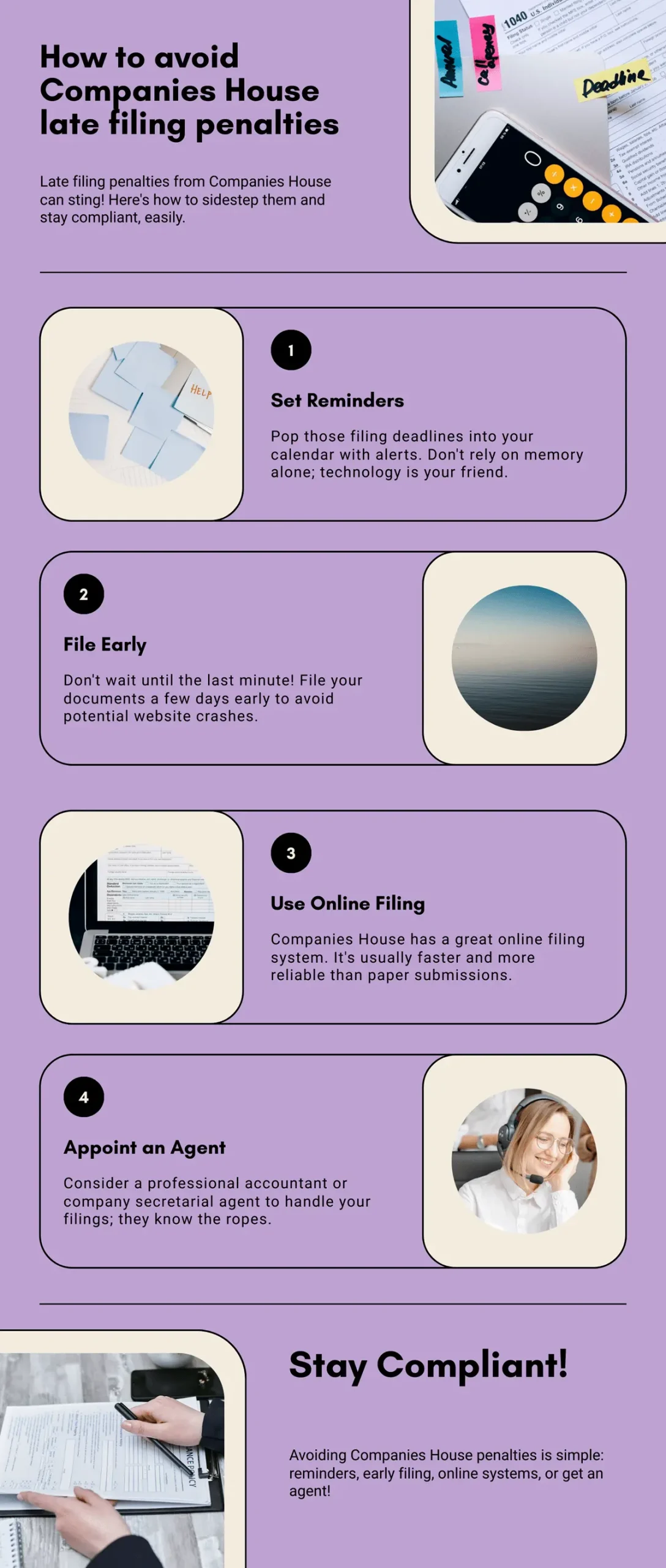Last Updated on January 8, 2026 by Joy Kyalo

One of the most hectic processes following company registration is running it. Handling day-to-day company operations and maintaining deadlines associated with annual reporting and tax filings can be overwhelming.
Without proper research or management on handling annual reporting with Companies House and HM Revenue and Customs (HMRC), your business may incur penalties, which can negatively affect the company’s finances and reputation.
By understanding Companies House late filing penalties, it will be easier for you as a business owner not to miss any deadlines. This article will guide you on the annual reporting to Companies House, dates and deadlines, and the penalties incurred in the case of late filing.
Key Takeaways
- UK companies must file Confirmation Statements, Annual Accounts, and tax returns (including VAT) on time with Companies House and HMRC.
- Missing deadlines can lead to penalties, reputational damage, or even being struck off.
- Manage deadlines well: set reminders, file online, and don’t overlook weekends or holidays.
- If it feels too much, hire an accountant or formation agent to stay compliant and stress-free.
Which statutory documents must be filed with Companies House?

Confirmation Statements
A Confirmation Statement is filed annually. This notifies Companies House that the records they have for the company are up-to-date. When you register a company with Companies House, whether it’s a private limited company or a limited liability partnership (LLP), the company’s information will be made available to the public.
Within the 12 months, to ensure the company’s records are accurate and up-to-date, the company must file Confirmation Statements that contain details such as UK registered office address, company name, officers’ details, SIC codes, shareholders and capital share.
The date to file the Confirmation Statement may vary from one company to another. If you incorporated a UK company on February 6th, 2025, you will be expected to file the Confirmation Statement by February 6th, 2026. The deadline to file will be 14 days after the review period, which is February 20th, 2026.
Annual Accounts
These are financial statements that must be filed annually. These must be filed annually, whether the company is trading or not. By filing Annual Accounts, you notify Companies House of the profits and losses over the financial year.
The first Annual Accounts must be filed 9 months after the company’s year ends. With the example above, the financial year is February 6th, 2026, the accounts must be filed with Companies House no later than 30th November.
The first accounting period due date is 21 months after your company is registered. With the same example, the company’s incorporation date is February 6th, 2025, so the first accounting period for filing Annual Accounts will be November 6th, 2026.
Company tax returns
Company tax returns, which include Corporate Tax, Value Added Tax (VAT), Pay-as-you-earn (PAYE), and many more, are filed with HMRC. Like statutory records, company tax returns must be filed annually, apart from VAT, which is filed every quarter of the year.
What are Companies House’s late filing penalties?
The penalties get heftier depending on the period taken to file the statutory records and in extreme cases. While there are no any penalties for filing Confirmation Statements late, the company may be struck off from the register.
Companies House Late filing penalties for Annual Accounts include;
| Period for late filing | Penalty for a private company or LLP | Penalty for a public company |
| 1 day to 1 month | £150 | £750 |
| More than 1 month to 3 months | £375 | £1,500 |
| More than 3 months to 6 months | £750 | £3,000 |
| More than 6 months | £1,500 | £7,500 |
What are HMRC’s late filing penalties?
Corporate tax penalties include;
| Duration after your deadline | Penalty |
| 1 day late | £100 |
| 3 months late | An additional £100 |
| 6 months late | 10% penalty on the Corporate Tax bill. |
| 12 months late | Another 10% of unpaid tax |
VAT late filing penalties include;
- 100% of any over-claimed tax return with careless mistakes.
- 30% of an assessment if HMRC sends you one that’s too low and you do not tell them it’s wrong within 30 days
- £400 if you submit a paper VAT Return unless HMRC has told you you’re exempt from submitting your return online.
Tips on how to avoid Companies House late filing penalties
Know the deadlines: Once you form your UK company, ensure you understand all statutory records and tax return deadlines.
Set reminders: There are various ways to set reminders and not forget the filing deadlines. Tools such as calendar apps, project management software and reminder apps can be helpful. Most, if not all, systems have an in-built calendar app with a reminder feature. If your business uses any of the project management software such as Trello or Asana, you can leverage their reminder feature by setting the deadline for filing statutory or tax returns.
File online: Filing your annual reports online is quick and efficient guaranteeing you meeting deadlines on time. When you file through paper submission, you are not guaranteed that the process will be done before the deadline, and in the case of any mistake, you may have to repeat the whole process which may likely make you miss the deadline.
The online filing also helps with built-in checks to help you avoid errors and rejections.
Do not disregard weekends and bank holidays: If the deadline for your accounting period falls on a weekend or a bank holiday, you should still file by that date.
Hire an accountant or an agent: If you have so much going on with your business to do your filings, you can onboard an accountant or a UK company formation agent who can help you not miss the deadlines by regularly communicating with them.

What to do if you miss the deadline?
File immediately: You can file immediately, if you genuinely forgot and are late by a day or two. Even if you cannot pay the tax you owe, just file immediately to help you limit the penalty charges from growing.
Call HMRC: If for any reason you missed the deadline because of a serious illness or bereavement, you can call HMRC and explain. This may lead to penalties being reduced as long as you have proof to support your claim.
Request payment arrangement plan: If you cannot make all payments at once, request HMRC for a payment arrangement plan. This will help spread the payment plan to a period of one year giving you time to pay all that is due.
Conclusion:
To sum it up, Companies House’s late filing penalties can affect your business’s finances and reputation. When a company fails to file statutory documents, it will be seen in the public register negatively affecting the image of your company.
No need to miss your filing deadlines and incur penalties. BusinAssist offers ongoing services to keep your business compliant with Companies House and HMRC. We offer affordable Confirmation Statements and Annual Accounts filings. We also offer VAT registration and filing services.
Do not allow your business to incur late filing penalties, contact BusinAssist at info@businassist.com.
FAQs:
Q: What are late tax return filing penalties?
Ans: Late tax return filing penalties include a £100 penalty on the first day after the deadline, an additional £10 per day after 3 months, and up to a maximum of £900.
Q: Are late filing penalties tax-deductible?
Ans: Late tax filing penalties are not tax-deductible since they are a disallowable expense.
Q: How much is a late filing penalty?
Ans: The penalty will depend on the late filings. If your company’s Confirmation Statement is filed late, the company may be struck off. For late Annual Accounts filings for private companies, penalties include £150 for not more than one month, £375 for not more than three months, £750 for not more than six months and £1,500 for more than six months.
For public companies, late Annual Accounts filing penalties include: £750 after one month, £1,500 for not more than three months, £3,000 for not more than six months, and £7,500 for more than six months.
Q: How to appeal an HMRC late filing penalty?
Ans: To appeal HMRC’s late filing penalties, start by checking the deadline and eligibility of the filing, which must be appealed within 30 days of the penalty notice date. Gather supporting evidence, such as dates and timelines of what happened then appeal to HMRC online, by post, or by phone.
HMRC may take 45 days to make a decision, however, it may take longer. If HMRC rejects the appeal, you can request an internal review by HMRC or take the appeal to the First-tier Tax Tribunal.
Q: How to avoid a late filing penalty?
Ans:
- Know your filing deadlines
- Register early
- File for tax returns even if you can’t pay the tax due yet
- Onboard an accountant, accounting software, or UK company formation agent
- Keep accurate and up-to-date records
- Check for any updates from HMRC
- Submit even if you have zero returns
Q: Is there a late filing penalty if no tax is due?
Ans: If no tax is due and still file tax returns late you will incur penalties. You will incur £100 even when you don’t owe any taxes, and £10 per day if it is not filed within 3 months, to a maximum of £900.
Read Also:
- Understanding the Certificate of Good Standing for UK Companies: What It Is and Why It Matters!
- How to Change Your SIC Code on Companies House: A Step-by-Step Guide for UK Businesses
- Lost Your Government Gateway User ID and Password? Here’s How to Find Them
- Everything You Need to Know About Companies House Default Address
- Can HMRC Access Your Bank Account? What Every Taxpayer Should Know
- Understanding HMRC Errors and Mistakes Guidance: Your Rights and Responsibilities
- Companies House Fee Increase – February 2026: What UK Startups Need to Know

Joy is a content writer at BusinAssist with 6+ years of experience in content marketing and social media strategy. She specialises in company formation and virtual operations, guiding entrepreneurs through global markets with clarity, drawing on her marketing and PR background. Business Assist with BusinAssist – your business success partner.